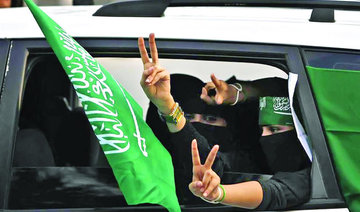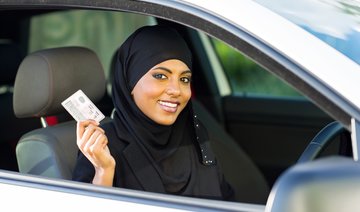LONDON: Car makers have been quick to target the new market of female motorists in Saudi Arabia as women are allowed to drive in the Kingdom for the first time.
Within hours of the news becoming public last week, car manufacturers from Ford to Jaguar were jostling for position in the race to win the attention of the lucrative new market.
By 10:30 a.m. on Wednesday morning, Jaguar MENA had released an advert on Twitter featuring car keys being added to the contents of a women’s handbag captioned: “The road is yours.”
“Show them what it means to drive the world forward” tweeted Cadillac Arabia alongside a picture of a woman looking out from the drivers’ seat window while Volkswagen Middle East told women “It’s your turn, take over the driver’s seat.”
The road is yours. #SaudiWomenCanDrive pic.twitter.com/KsW6E8Asls
— Jaguar MENA (@JaguarMENA) September 27, 2017
The scramble to court female drivers comes as no surprise with car companies looking to gain a foothold in a potentially lucrative new market of wealthy Saudi women.
“You’re talking about 2 or 3 million women and that’s a huge segment just created overnight,” said Hala Kudwah, financial services consulting leader at PwC in Saudi Arabia.
Manufacturers may also be hoping that women buyers will help to alleviate a 28-percent drop in car sales during the first seven months of 2017.
Analysts at IHS Markit told Bloomberg that the decision was likely to boost the automotive sector in the short to long term.
Rebecca Mahony, chief marketing officer at Media iQ, pointed to obvious revenue benefits for car brands in seizing the moment. “For them it’s about reaching an untapped market while it’s still fresh,” she said.
Welcome to the driver’s seat. #SaudiWomenMove #SaudiWomenCanDrive pic.twitter.com/oksRbFvLWa
— Ford Middle East (@FordMiddleEast) September 27, 2017
“They are certainly treating this as a new opportunity and seizing the moment.”
Nissan Middle East was one of the first to join the conversation, publishing a KSA number plate dated 2018 with the letters “GRL” and “bint” (Arabic for girl).
“This was a historic moment for the women of Saudi Arabia and a historic moment for the country itself, so it was only natural that a progressive brand such as Nissan would want to be involved in some way,” said Fadi Ghosn CMO Nissan Middle East.
“It wasn’t planned and it wasn’t contrived. It was an instantaneous reaction to a historic event.
“Who wouldn’t want to congratulate them,” he added.
The adverts tapped into the celebratory spirit on Twitter, where an Arabic hashtag asking women which car they wanted to drive generated more than 20,000 responses by Thursday afternoon.
“My dream is to get the new version of Nissan Z” tweeted one woman in response to Nissan’s advert. Others shared images of luxury SUVs while a few posted pictures of cars encrusted with crystals.
But some felt the adverts overlooked the real significance of the decision and accused the car companies of perpetuating stereotypes associated with Saudi women.
Saima Zahidi, who lives in Jeddah, told Arab News: “These ads are bypassing the serious-minded and professional Saudi woman that is the real market base of the future automobile industry.
“It’s the career woman who has both the need and purchasing power for the cars. This is exactly the segment these ads are missing out on.” she said.
Gordon Young, editor of marketing magazine The Drum, said that many of the adverts seemed to have been created in haste and lacked subtlety.
“The ads I have seem so far seem to be dealing with Saudi women as a group rather than individuals. They seem very much focused on the stereotypes of Saudi culture as opposed to what makes the benefits of their products unique.
“It is almost as though these ads have been created by Western men, who perhaps do not have deep insights or real empathy with the market,” he said.
“Given the sensitivity of the topic and the arguments around how Saudi women are profiled, it will be interesting to see what other types of ads and commercials they come up with,” Mahony said.
“I think it is clear that these ads are all meant to be empowering women but of course fail when it comes to stereotyping them, which I’m not sure can be avoided,” she added.
Twitter users were quick to comment, with many taking the opportunity to share their support. Karen van Drie tweeted to say “What a great ad!”
Ford Middle East raised questions with its image featuring a woman’s eyes in the driving mirror against a black backdrop captioned “Welcome to the driver’s seat.” Some praised the design while others tweeted to point out the picture’s close resemblance to an award-winning image published on the website Rafeef22.
From a practical perspective, Young said, the adverts fail to differentiate between car brands. “These ads could have featured any car logo. The creative treatment is interchangeable.
“I suspect as the dust settles ads will emerge that balance the unique characteristic of the car brands with the specific demands of the market. But I do think the ad strategy needs to be driven with people who have a far deeper understanding of the target audience,” he added.
Describing the adverts as “funny and cheesy” but also playing on stereotypes, Saudi writer Maha Akeel said: “I would advise car companies not to rush into releasing ads that might backfire.
“They’ll be surprised to know that Saudi women already know a lot about cars and driving so they don’t need to be so patronizing,” she told Arab News.
















